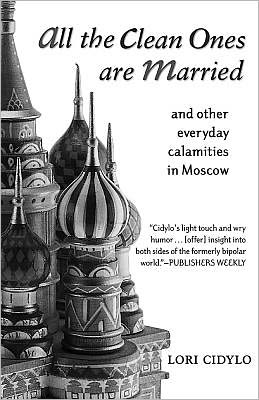

 |

|

The average rating for All the Clean Ones Are Married: And Other Everyday Calamities in Moscow based on 2 reviews is 4 stars.
Review # 1 was written on 2016-04-12 00:00:00 Andy Riley Andy RileyI sat on the couch, trying to absorb what was happening on the screen in front of me. Was it possible that I was actually watching live television coverage of people killing one another? (248) At 25, Cidylo'the daughter of Polish-Ukrainian immigrant parents'decided to move to Moscow. Her parents were horrified, but Cidylo, who had studied Russian, was determined. Off she went, with job offer in hand and plans to seek freelance writing work with newspapers Stateside. Two weeks after she got to Moscow, the Soviet Union collapsed. Cidylo slips in and out of time throughout the book, here describing what was going on in Moscow in her experience in the early 90s and there describing what it's like now (though 'now', in the context of the book, means ~2001). She stayed for about six years, learning to roll with the changes and adapt as need be. (Me, I would have been gone the moment a cockroach fell of the ceiling and landed in my hair(!), but, well. Her version is of course more interesting for the fact that she stayed.) I struggled with the time frame in places, because it's not at all the linear sort of narrative one often gets from memoir...and yet it's at the end that this non-linear choice makes the most sense. What better place to put the most dramatic, overwhelming, unexpected events of the book than as a climactic end? It's truly a foreign world to me, the Moscow Cidylo describes. Currency is constantly in flux, items like washing machines are nigh on impossible to find, and there's a strange dichotomy between emphasis on motherhood and cheapness of human life. Several other well-intentioned friends gave me the same advice [to have a child whether or not she was married]. I tried to explain that I didn't want children just then; I wanted to get married first. When I saw the bewilderment in their eyes, I realized that in Russia, whether a woman wants to become a mother is irrelevant. "Women who don't have children are selfish," the popular saying goes. (213) For a woman, motherhood was the ultimate goal'and yet Cidylo also tells of the lack of care drivers had for pedestrians, of almost getting run over multiple times by drivers who couldn't have cared less, and of a police officer casually kicking (in the torso, in the head) a man who lay for hours in the street, dying, after being hit by a car. A foreign world, and so often a hostile one. Yet she stayed. She carved out a space for herself and, for at least those years, stayed. Something about life there seemed right to her'for a journalist, it must have been an absolutely fascinating time and place to be working'and for all that she talks about the difficulties, she also finds beauty in little things, like the older woman who helps her turn her ugly apartment into a home. Such interesting clashes between beauty and ugliness, old culture and new, inside perspective and outside. Bits and bobs: I had just turned on my computer and was still trying to get used to the sight of a Cyrillic keyboard when a tall, wiry young man approached my desk. He smiled shyly, revealing two dimples. "You must be Lori," he said. "My name's Sasha. I'm a translator here. So what do you think of this crazy country?" I laughed, but I soon realized that Sasha wasn't being facetious. Two weeks after I arrived, the Soviet Union collapsed. (21) Imagine a presidential candidate stepping up to the rostrum and promising voters that he won't send anyone to a labor camp. That's exactly what Gennadi Zyuganov, the Communist candidate, told his constituents when he ran for office in 2000. (37-38) When I finally found my apartment, I went back outside and took a good look at the building. There had to be something distinctive about it. When I looked carefully, I saw that someone had smashed a hole in the plastic panel on the front door. But then I noticed that the doors of three of the other buildings had holes too. So I memorized the shape of the hole--it looked a little like a horse's hoof--and made a mental note that it was just about the doorknob. And that was how I learned to recognize my building, by looking for the horse's hoof. (52) |
Review # 2 was written on 2013-02-13 00:00:00 Ricardo Cruz Bravo Ricardo Cruz BravoThis is a short, charming, and insightful book outlining an American journalist's time spent living in Moscow in the 1990s. Russian culture is what is mainly discussed, but the political and economic climate is also touched upon - rightly so considering the climate during that time period. I loved Lori Cidylo's anecdotes, which were very often funny but also very telling about certain aspects of the Russian character and of life in Russia. As someone who has spent some time in Russia in more recent years, I often smiled in agreement when reading about some stranger aspects of Russian culture. What I appreciated most about these acknowledgements about the curious elements of Russian life was that she made an effort to explain why and how they came about. Thus, through reading the book you not only learn how the Russians were during this time, but how they got that way. This is a fast, but very fun read that I would highly recommend for anyone who is fascinated by the Russians. |
CAN'T FIND WHAT YOU'RE LOOKING FOR? CLICK HERE!!!